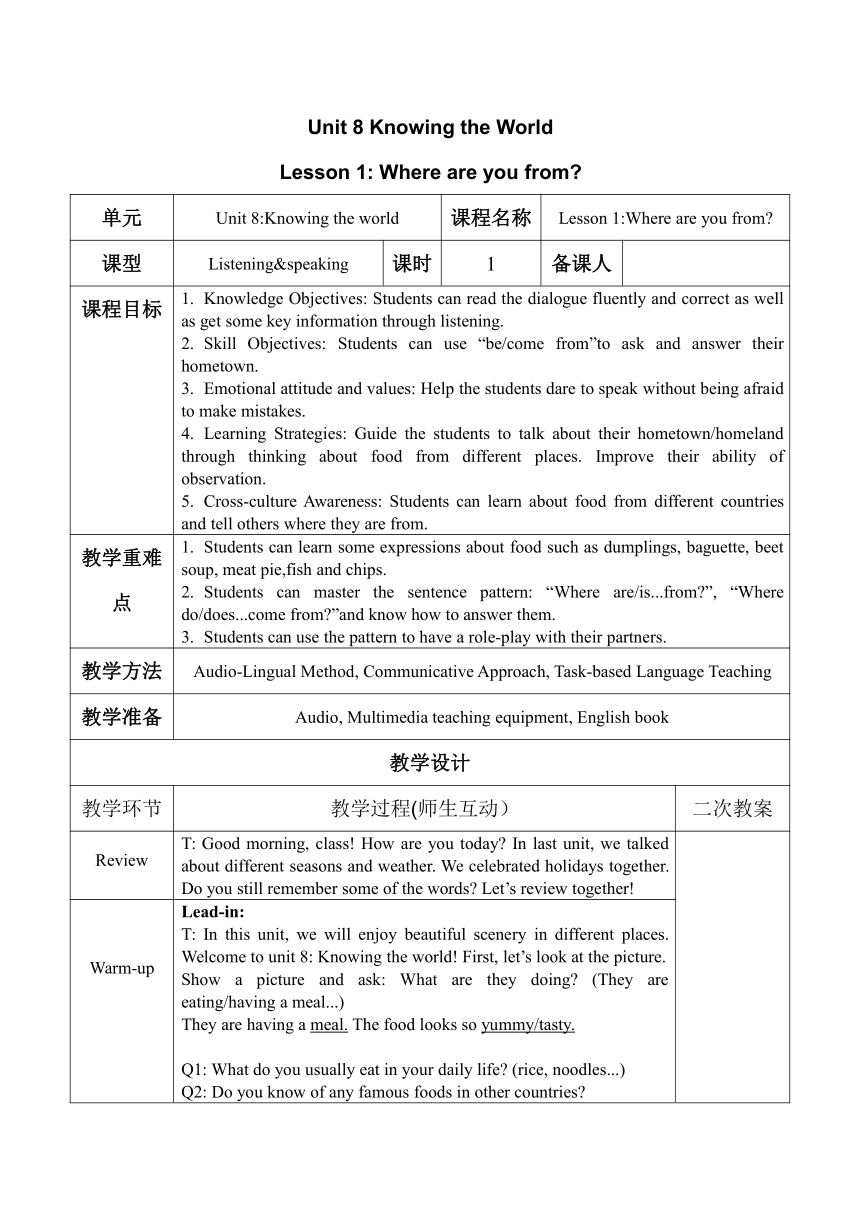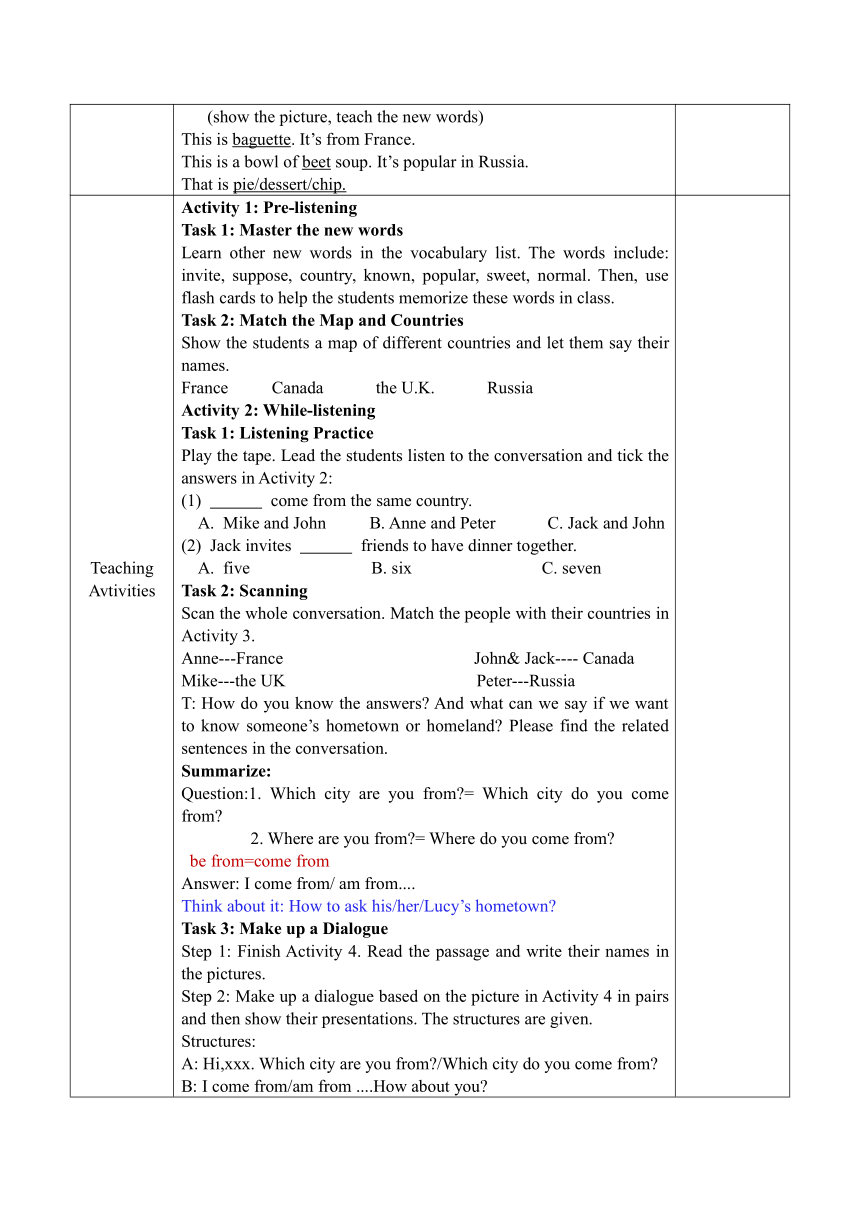Unit 8Knowing the world Lesson 1 教案(表格式) 2024-2025学年冀教版(2024)七年级英语上册
文档属性
| 名称 | Unit 8Knowing the world Lesson 1 教案(表格式) 2024-2025学年冀教版(2024)七年级英语上册 |

|
|
| 格式 | docx | ||
| 文件大小 | 23.2KB | ||
| 资源类型 | 教案 | ||
| 版本资源 | 冀教版 | ||
| 科目 | 英语 | ||
| 更新时间 | 2024-12-03 00:00:00 | ||
图片预览


文档简介
Unit 8 Knowing the World
Lesson 1: Where are you from
单元 Unit 8:Knowing the world 课程名称 Lesson 1:Where are you from
课型 Listening&speaking 课时 1 备课人
课程目标 Knowledge Objectives: Students can read the dialogue fluently and correct as well as get some key information through listening. Skill Objectives: Students can use “be/come from”to ask and answer their hometown. Emotional attitude and values: Help the students dare to speak without being afraid to make mistakes. Learning Strategies: Guide the students to talk about their hometown/homeland through thinking about food from different places. Improve their ability of observation. Cross-culture Awareness: Students can learn about food from different countries and tell others where they are from.
教学重难点 Students can learn some expressions about food such as dumplings, baguette, beet soup, meat pie,fish and chips. Students can master the sentence pattern: “Where are/is...from ”, “Where do/does...come from ”and know how to answer them. Students can use the pattern to have a role-play with their partners.
教学方法 Audio-Lingual Method, Communicative Approach, Task-based Language Teaching
教学准备 Audio, Multimedia teaching equipment, English book
教学设计
教学环节 教学过程(师生互动) 二次教案
Review T: Good morning, class! How are you today In last unit, we talked about different seasons and weather. We celebrated holidays together. Do you still remember some of the words Let’s review together!
Warm-up Lead-in: T: In this unit, we will enjoy beautiful scenery in different places. Welcome to unit 8: Knowing the world! First, let’s look at the picture. Show a picture and ask: What are they doing (They are eating/having a meal...) They are having a meal. The food looks so yummy/tasty. Q1: What do you usually eat in your daily life (rice, noodles...) Q2: Do you know of any famous foods in other countries (show the picture, teach the new words) This is baguette. It’s from France. This is a bowl of beet soup. It’s popular in Russia. That is pie/dessert/chip.
Teaching Avtivities Activity 1: Pre-listening Task 1: Master the new words Learn other new words in the vocabulary list. The words include: invite, suppose, country, known, popular, sweet, normal. Then, use flash cards to help the students memorize these words in class. Task 2: Match the Map and Countries Show the students a map of different countries and let them say their names. France Canada the U.K. Russia Activity 2: While-listening Task 1: Listening Practice Play the tape. Lead the students listen to the conversation and tick the answers in Activity 2: come from the same country. Mike and John B. Anne and Peter C. Jack and John Jack invites friends to have dinner together. five B. six C. seven Task 2: Scanning Scan the whole conversation. Match the people with their countries in Activity 3. Anne---France John& Jack---- Canada Mike---the UK Peter---Russia T: How do you know the answers And what can we say if we want to know someone’s hometown or homeland Please find the related sentences in the conversation. Summarize: Question:1. Which city are you from = Which city do you come from 2. Where are you from = Where do you come from be from=come from Answer: I come from/ am from.... Think about it: How to ask his/her/Lucy’s hometown Task 3: Make up a Dialogue Step 1: Finish Activity 4. Read the passage and write their names in the pictures. Step 2: Make up a dialogue based on the picture in Activity 4 in pairs and then show their presentations. The structures are given. Structures: A: Hi,xxx. Which city are you from /Which city do you come from B: I come from/am from ....How about you A:........ Oh, look at this picture. Where does xxx come from / Where is xxx from B: He/She comes from....(He/She is from....) Activity 3: Post-listening Task 1:Review the Dialogue Show a passage related to the dialogue. Ask the students to fill in the blanks and add some more knowledge points. Jack invites his friends to have dinner together. Each friend is supposed to bring a food from their country. There are a lot of friends from different countries. France is known for a kind of bread called baguette. Beet soup is popular in Russia. Meat pie is tasty and it’s not sweet like normal pie. We can’t wait to eat them! Knowledge Points:(每一个知识点在文段中设置了超链接) invite sb. to do sth. invite sb. to sw. be supposed to do sth 理应做某事,应该做某事。有时可与should替换。但be supposed to do更多地强调基于某种规定、习惯和社会规范需要做某事。而should更多地用于表达主观上认为需要做某事,用于提出建议、劝告。 supposed还有“认为;假定;设想”的含义。 be (well) known for 因...而闻名=be famous for be (well) known as 作为...而闻名=be famous as be known to sb. 为某人所熟知 be popular in + 地点 流行于(某地) be popular with 受到...的欢迎 can't wait to do 等不及做某事/迫不及待做某事 Task 2:Exercise 根据要求完成句子。 Li Ming is from China.(改成同义句) I come from Beijing. (对划线部分提问) 我迫不及待地想去那里了。(根据汉语完成句子) I go there. 每个人都应该遵守交通规则。(用suppose的适当词组) Everyone obey the traffic rules. 单项选择。 Most of the students like playing basketball. It’s . tasty B.beautiful C.sunny D.popular Beijing is known the Great Wall. for B.as C.to D. in I want invite you a movie. Would you like to come A.watch B.to watch C.watching D.to watching
Homework
Blackboard Design
Teaching Reflection
Lesson 1: Where are you from
单元 Unit 8:Knowing the world 课程名称 Lesson 1:Where are you from
课型 Listening&speaking 课时 1 备课人
课程目标 Knowledge Objectives: Students can read the dialogue fluently and correct as well as get some key information through listening. Skill Objectives: Students can use “be/come from”to ask and answer their hometown. Emotional attitude and values: Help the students dare to speak without being afraid to make mistakes. Learning Strategies: Guide the students to talk about their hometown/homeland through thinking about food from different places. Improve their ability of observation. Cross-culture Awareness: Students can learn about food from different countries and tell others where they are from.
教学重难点 Students can learn some expressions about food such as dumplings, baguette, beet soup, meat pie,fish and chips. Students can master the sentence pattern: “Where are/is...from ”, “Where do/does...come from ”and know how to answer them. Students can use the pattern to have a role-play with their partners.
教学方法 Audio-Lingual Method, Communicative Approach, Task-based Language Teaching
教学准备 Audio, Multimedia teaching equipment, English book
教学设计
教学环节 教学过程(师生互动) 二次教案
Review T: Good morning, class! How are you today In last unit, we talked about different seasons and weather. We celebrated holidays together. Do you still remember some of the words Let’s review together!
Warm-up Lead-in: T: In this unit, we will enjoy beautiful scenery in different places. Welcome to unit 8: Knowing the world! First, let’s look at the picture. Show a picture and ask: What are they doing (They are eating/having a meal...) They are having a meal. The food looks so yummy/tasty. Q1: What do you usually eat in your daily life (rice, noodles...) Q2: Do you know of any famous foods in other countries (show the picture, teach the new words) This is baguette. It’s from France. This is a bowl of beet soup. It’s popular in Russia. That is pie/dessert/chip.
Teaching Avtivities Activity 1: Pre-listening Task 1: Master the new words Learn other new words in the vocabulary list. The words include: invite, suppose, country, known, popular, sweet, normal. Then, use flash cards to help the students memorize these words in class. Task 2: Match the Map and Countries Show the students a map of different countries and let them say their names. France Canada the U.K. Russia Activity 2: While-listening Task 1: Listening Practice Play the tape. Lead the students listen to the conversation and tick the answers in Activity 2: come from the same country. Mike and John B. Anne and Peter C. Jack and John Jack invites friends to have dinner together. five B. six C. seven Task 2: Scanning Scan the whole conversation. Match the people with their countries in Activity 3. Anne---France John& Jack---- Canada Mike---the UK Peter---Russia T: How do you know the answers And what can we say if we want to know someone’s hometown or homeland Please find the related sentences in the conversation. Summarize: Question:1. Which city are you from = Which city do you come from 2. Where are you from = Where do you come from be from=come from Answer: I come from/ am from.... Think about it: How to ask his/her/Lucy’s hometown Task 3: Make up a Dialogue Step 1: Finish Activity 4. Read the passage and write their names in the pictures. Step 2: Make up a dialogue based on the picture in Activity 4 in pairs and then show their presentations. The structures are given. Structures: A: Hi,xxx. Which city are you from /Which city do you come from B: I come from/am from ....How about you A:........ Oh, look at this picture. Where does xxx come from / Where is xxx from B: He/She comes from....(He/She is from....) Activity 3: Post-listening Task 1:Review the Dialogue Show a passage related to the dialogue. Ask the students to fill in the blanks and add some more knowledge points. Jack invites his friends to have dinner together. Each friend is supposed to bring a food from their country. There are a lot of friends from different countries. France is known for a kind of bread called baguette. Beet soup is popular in Russia. Meat pie is tasty and it’s not sweet like normal pie. We can’t wait to eat them! Knowledge Points:(每一个知识点在文段中设置了超链接) invite sb. to do sth. invite sb. to sw. be supposed to do sth 理应做某事,应该做某事。有时可与should替换。但be supposed to do更多地强调基于某种规定、习惯和社会规范需要做某事。而should更多地用于表达主观上认为需要做某事,用于提出建议、劝告。 supposed还有“认为;假定;设想”的含义。 be (well) known for 因...而闻名=be famous for be (well) known as 作为...而闻名=be famous as be known to sb. 为某人所熟知 be popular in + 地点 流行于(某地) be popular with 受到...的欢迎 can't wait to do 等不及做某事/迫不及待做某事 Task 2:Exercise 根据要求完成句子。 Li Ming is from China.(改成同义句) I come from Beijing. (对划线部分提问) 我迫不及待地想去那里了。(根据汉语完成句子) I go there. 每个人都应该遵守交通规则。(用suppose的适当词组) Everyone obey the traffic rules. 单项选择。 Most of the students like playing basketball. It’s . tasty B.beautiful C.sunny D.popular Beijing is known the Great Wall. for B.as C.to D. in I want invite you a movie. Would you like to come A.watch B.to watch C.watching D.to watching
Homework
Blackboard Design
Teaching Reflection
同课章节目录
